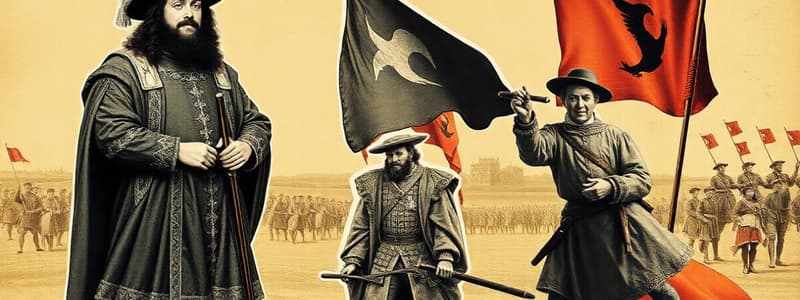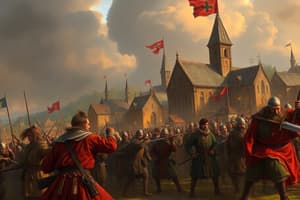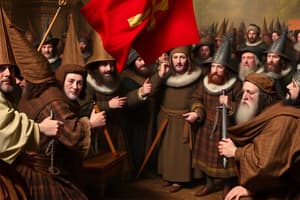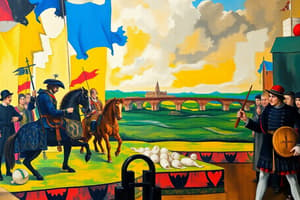Podcast
Questions and Answers
Which of the following was a primary reason for the Thirty Years' War?
Which of the following was a primary reason for the Thirty Years' War?
- Religious tension (correct)
- Economic benefits
- Maritime disputes
- Territorial expansion
The Peace of Westphalia concluded the Thirty Years' War.
The Peace of Westphalia concluded the Thirty Years' War.
True (A)
What is the significance of the Defenestration of Prague in the context of the Thirty Years' War?
What is the significance of the Defenestration of Prague in the context of the Thirty Years' War?
It was the event that triggered the war due to the conflict between Protestants and Catholics.
Louis XIV is often referred to as the _____ King.
Louis XIV is often referred to as the _____ King.
Match the following English monarchs with their contributions:
Match the following English monarchs with their contributions:
Which statement best describes the concept of absolutism as practiced by Louis XIV?
Which statement best describes the concept of absolutism as practiced by Louis XIV?
The Edict of Fontainebleau revoked the Edict of Nantes.
The Edict of Fontainebleau revoked the Edict of Nantes.
What major change occurred to England's government under Cromwell's rule?
What major change occurred to England's government under Cromwell's rule?
Flashcards
Peace of Augsburg and the Thirty Years' War
Peace of Augsburg and the Thirty Years' War
The Peace of Augsburg (1555) recognized Lutheranism in Germany, temporarily ending religious conflicts. The Thirty Years' War (1618-1648) reignited tensions, fueled by Catholic and Protestant divisions and competing power struggles.
Defenestration of Prague
Defenestration of Prague
The Defenestration of Prague (1618), a dramatic incident where Protestant Bohemian nobles threw two royal officials out of a window, sparked the Thirty Years' War. This event showcased the growing religious tensions.
Louis XIV and Absolutism
Louis XIV and Absolutism
Louis XIV (1643-1715), known as the Sun King, epitomized Absolutism, believing in the divine right of kings and complete control over the state and society.
Versailles
Versailles
Signup and view all the flashcards
Edict of Fontainebleau
Edict of Fontainebleau
Signup and view all the flashcards
The Dutch Golden Age
The Dutch Golden Age
Signup and view all the flashcards
English Civil War
English Civil War
Signup and view all the flashcards
The Glorious Revolution
The Glorious Revolution
Signup and view all the flashcards
Study Notes
Thirty Years' War
- Religious tensions fueled by the Peace of Augsburg, a temporary resolution of religious conflict, ignited the Thirty Years' War.
- The Defenestration of Prague, a symbolic act, served as a catalyst for the war.
- The conflict was multifaceted, encompassing both religious and power struggles among major European powers.
- Key powers embroiled in the war were involved due to complex political maneuvering and evolving alliances.
- France, under Louis XIII and Cardinal Richelieu, played a critical role, aiming to weaken the Habsburgs and strengthen the French monarchy.
- Richelieu's strategic goals included bolstering royal power, controlling powerful nobles, navigating religious issues, and dismantling Habsburg influence in the Thirty Years' War.
- The Peace of Westphalia concluded the war, altering the European political landscape.
Louis XIV
- Louis XIV personified absolutism, epitomized by the declaration "L'état c'est moi" (I am the state).
- Characteristics of his absolute monarchy included centralized control, concentrated power, and the belief in the divine right of kings.
- The construction of Versailles reflected Louis XIV's ambition and impacted French nobility and the economy.
- Versailles fostered dependence on the king, reshaping the social hierarchy, and requiring economic resources, ultimately impacting French finances.
- Louis XIV, styled the Sun King, effectively managed a complex bureaucracy.
- The Edict of Fontainebleau revoked the Edict of Nantes, impacting religious freedom and potentially hindering economic elements.
- Colbert's economic policies aimed to strengthen France, potentially incorporating taxation and mercantilist ideas.
- Louvois's military policies enhanced France's standing.
- Balancing European powers and the economic ramifications of Louis XIV's wars, including the conflict of the War of Spanish Succession, significantly affected France.
- The War of Spanish Succession involved a Grand Alliance and culminated in the Treaty of Utrecht, impacting France's international position.
Constitutionalism
- The Dutch Republic, during its Golden Age, showcased a unique path to governance emphasizing the principles of a republic.
- Its economic prosperity, rooted in trade and commerce, and advancements in the arts and sciences, combined to define a cultural renaissance.
- The Dutch Republic's flourishing artistic and scientific movements reflected a spirit of pioneering innovation.
- English constitutional development unfolded, from the Magna Carta to the Hanover dynasty.
- The Magna Carta's establishment of the Great Council (precursor to Parliament) laid the groundwork for future political changes.
English Monarchy (Turbulent period)
- Elizabeth I's reign, marked by astute religious management, strategic political decisions, and successes against external threats, such as Mary Queen of Scots and the Spanish Armada.
- The reign of James I (VI of Scotland) and the Stuart Dynasty witnessed religious and political conflicts.
- The translation of the King James Bible and the perceived dictatorial nature of James' policies alienated Parliament.
- Political conflicts between Charles I and Parliament deepened during his reign, fueled by religious disagreements and a growing distrust of royal absolutism.
- His dismissal of Parliament and actions in religious spheres angered English constituents.
- The English Civil War arose from the conflict between Charles I and Parliament, resulting in the execution of the king and the establishment of a republic.
- The English Civil War, a key moment in English history, profoundly altered the political landscape, leading to the rule of Cromwell and the establishment of a commonwealth.
- The restoration of the monarchy brought Charles II to the throne, addressing the questions of succession.
- The Glorious Revolution, prompted by concerns about James II's Catholicism, led to the peaceful ousting of James II and the establishment of a constitutional monarchy.
- The establishment of the English Bill of Rights solidified Parliament's power, further shaping the future of the English monarchy.
Studying That Suits You
Use AI to generate personalized quizzes and flashcards to suit your learning preferences.




